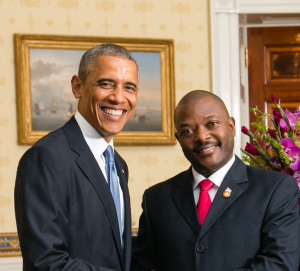As had been expected for several months now, on Saturday 25th April 2015 the National Council for the Defence of Democracy-Forces for the Defence of Democracy (CNDD-FDD) nominated Pierre Nkurunziza, outgoing President of the Republic, as their candidate for the 2015 presidential elections. Candidate Nkurunziza is thus officially campaigning for a third term in office.
This infamous “third term” has been much written about over the past few years on the continent. In the case of Burundi, it’s the interpretation of legal texts which has caused controversy. The constitution states that the President of the Republic is elected by direct universal suffrage for a term of five years, renewable once. However, Nkurunziza was only elected once by universal suffrage in 2010, his election in 2005 having been voted by Parliament. According to the wording of the constitution, Nkurunziza has the right to stand, but this constitution is the result of the Arusha Peace Agreement which put an end to a long civil war (1993-2006). This accord clearly states that no one can serve more than two terms as President of the Republic.
Thus those for and against a third term have been clashing over the legality of a new term for Nkurunziza, contributing to rising tensions in a political scene already set on edge by the CNDD-FDD’s authoritarian and interventionist tendencies towards its opposition and civil society.
Nkurunziza, candidate despite the pressure
As expected, the confirmation of this candidacy has resulted in protests in Bujumbura where repressive measures have unfortunately caused several fatalities. This is already too many lives lost. The eminent human rights defender, Pierre-Claver Mbonimpa was arrested on Monday 27th April and the country’s main independent radio station shut down. The situation is explosive: several thousand Burundians have already sought refuge in neighbouring countries while the Imbonerakure, the youth wing of the CNDD-FDD (considered by the UN to be a militia group) is accused of intimidating its opponents, bringing back sad memories of the Rwandan Interahamwe.
There are grounds to fear the consequences of this candidacy on the stability of the country and the whole region. However, several national and international players have warned against the destruction of the peace secured at Arusha. The political opposition, civil society organisations, the Catholic church, ex-president Buyoya, President Kikwete of Tanzania, The UN Secretary General Ban-Ki moon, his predecessor Kofi Annan, the African Union, the European Union, the United States and many others have all spoken out, to varying degrees, against a third term for Nkurunziza.
We can imagine that all of these public declarations by foreign partners, most notably that of the United States, have been accompanied by pressure applied behind the scenes. This pressure has therefore failed.
A candidacy which tests Obama’s will
Let us remember Barak Obama’s first speech on African soil in July 2009, shortly after his election: “Africa doesn’t need strong men, it needs strong institutions.” This declaration of intent has since been adopted by all the officials of his administration, for example the Secretary of State John Kerry, the Assistant Secretary for the Bureau of African Affairs Linda Thomas-Greenfield or the former Special Envoy for the Great Lakes region, Russell Feingold. The latter, as he was leaving his post in February 2015, reiterated the United States’ opposition to Nkurunziza, Sassou-Nguesso, Kabila, and Kagame staying in power beyond their current terms. The aim of this opposition was the consolidation of democracy in these countries affected by violent conflicts at the end of the 1990s. These four departures, some more than others, have almost become symbolic of the new US policy on Africa: Two terms and then leave.
Despite all these pressures, Nkurunziza is candidate for a third term which he will probably win considering his party’s hold over the state institutions and electoral commission. He is the first link in the chain and if it ends up working for him then why couldn’t Sassou, Kabila or Kagame do the same? Each country has its own context but the US made the link between them through one principle – democratic transfer of power.
It’s clear that the other presidents will be attentively following current events in Burundi, whilst at the same time scrutinising American reactions.
Shortly after the confirmation of Nkurunziza’s candidacy, several partners of Burundi expressed disappointment. The State Department said it profoundly regretted the loss of a historic opportunity to strengthen democracy. The US now hopes that what follows will be peaceful and has threatened sanctions on all those who may cause violence. As previously stated; the risk of conflict has unfortunately increased.
However, looking at the declarations which have already been made, certain questions spring to mind: What would the Obama administration do if the Nkurunziza regime succeeded in limiting the violence in the coming months? Would it secretly stir-up violence in order to be able to impose sanctions or would it tolerate Nkurunziza’s continued presidency in spite of its “recommendations”? How far is the US prepared to go to ensure that the principle of peaceful transfer of power is respected in Burundi and other countries in the region? The next few months will tell us much about the US’s determination because this is not only a matter of ensuring that closely-held principles are respected but also about honouring one’s word and not losing face.
